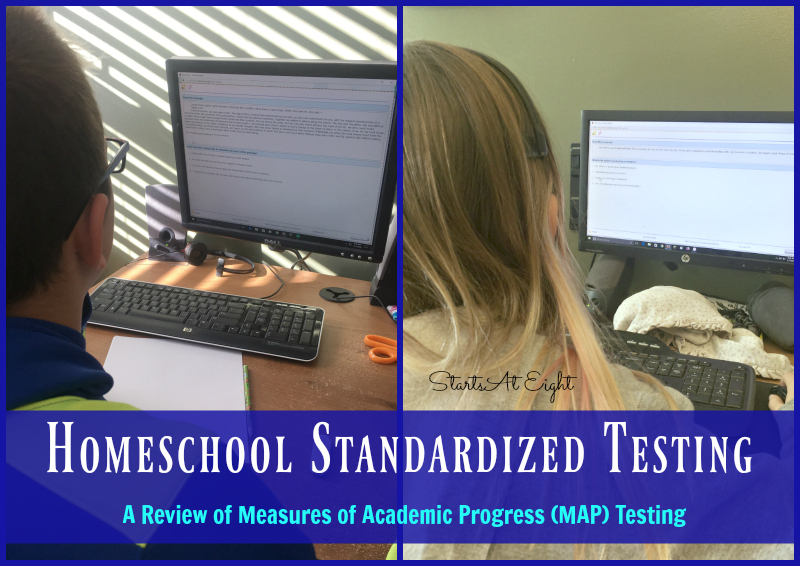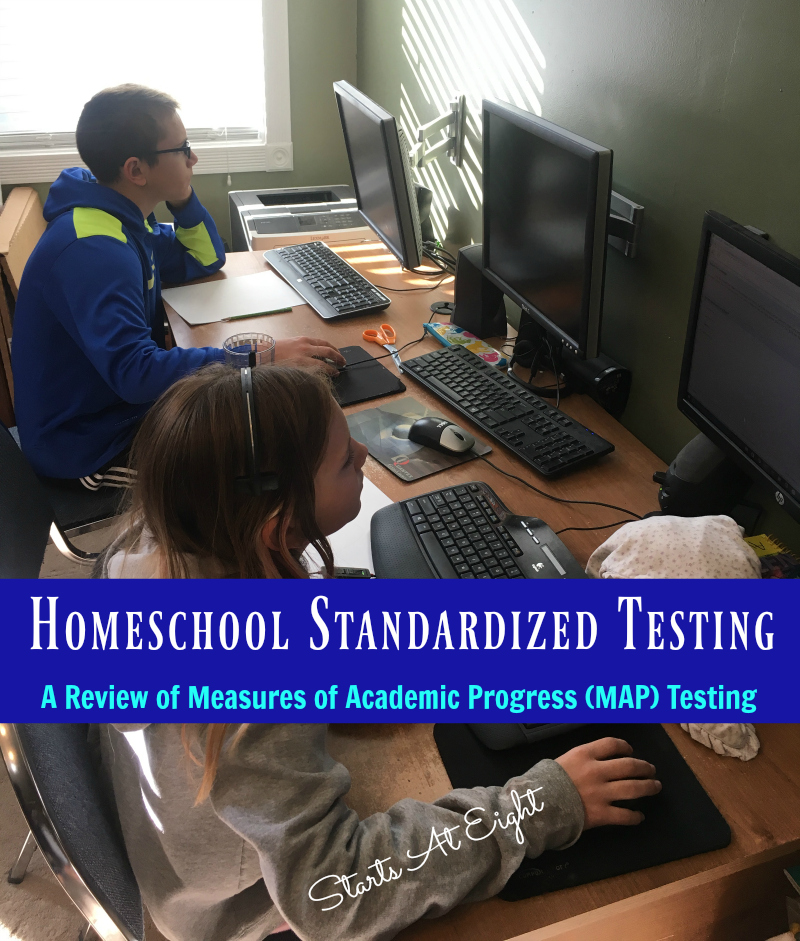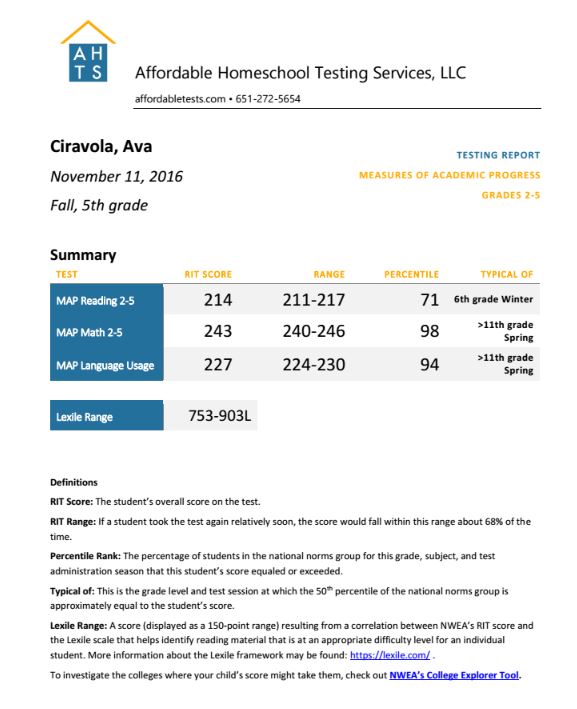Homeschool Standardized Testing: Testing Tips & A Review
Many frequently asked homeschooling questions pertain to homeschool standardized testing. Do our children take the same tests as the public school kids? Do we have to test our children? How and with what to do we test them? We as homeschoolers often wonder some of these same things. On top of that we often question, “Should I test my homeschooler?”

Here in New York State testing is required so it becomes an even more frequent question, as well as a source of anxiety for many homeschoolers. The good news is that it doesn’t have to be a major stress and there are easily accessible, affordable ways to do it.
Homeschool Standardized Testing Tips
As I have been homeschooling (and homeschooling in NYS) since 2006, I have acquired a few thoughts and strategies pertaining to dealing with homeschool standardized testing along the way.
Testing is not the resident evil. It’s easy to get on the big bad wolf band wagon when it comes to testing, however, I would recommend you take up the “it’s just another hoop” band wagon. It really is just a hoop when you are homeschooling. Your life doesn’t have to revolve around it, but if it is required in your state it isn’t the end of the world.
Exposure to testing when it doesn’t “count” helps to dispel test anxiety. Here in NYS we have to test alternating years from 4-8th grade, and every year during the high school years. As I have adapted the hoop jumping status, this is how I approach it with my children: I don’t make it a big stress, or a big deal, instead I start testing them in 3rd grade so that when I have to report the results to our district in 5th grade I can be confident in what our results will be. When I make it a normal part of the end of the year, when I don’t show stress or strife when it comes to testing myself, and when they can take a test and see that it wasn’t so bad, it reduces the amount of anxiety surrounding the experience.
Testing can help you assess gaps. While I agree that testing is not an end all be all, and isn’t always a great measure of knowledge, I have found it to be helpful. In the early years of testing my oldest (now in college) I was surprised to find the tests to be reflective of my thoughts. As in, I felt she struggled in math that year, or we hadn’t put enough emphasis on English grammar and those things were reflected in her scores. It allowed me some affirmation, and motivation to pick it up in one area or another for the coming year.
If you have the chance, try multiple types of tests. Trying various tests will give you a sense of what is involved, what you like and don’t like, and how your children respond to various types/styles of test taking and questions. In the early years I used the PASS Test (paper version) which is geared for students 8th grade and under. Then I switched to using the CAT Test (both paper and online) because it was both a NYS accepted test and it goes through high school. This year I found out about a new test, and I was excited to try MAP testing from Affordable Homeschool Testing Services LLC!
Measures of Academic Progress (MAP) Testing

The Measures of Academic Progress (MAP) Tests offered by Affordable Homeschool Testing Services are nationally normed, standardized achievement tests that assess student growth and are offered in Reading, Math, and an optional Language Usage test. The tests are NOT timed, and are web-based so they can be taken on your laptop, iPad, or Chromebook and are administered remotely by Affordable Homeschool Testing Services. {I received free testing for my children and was compensated for my time in writing this review. All views are my own and I was not required to write a positive review. Please see my full Disclosure Policy for more details.}
The Nuts & Bolts of Homeschool Standardized Testing with MAP Tests
We scheduled to take the Measures of Academic Progress (MAP) Tests for both my elementary age daughter and my middle school age son. They each took Reading, Math and the optional Language Usage tests over a period of 3 days.
If your kids do not have testing experience, Affordable Homeschool Testing Services has a customized practice area for your students, where they can get a feel for how their MAP test will look and work.
1. Ease of Scheduling
Scheduling through the website is so easy! You are given options of times, you pick, they schedule, and even send you a reminder (which includes any information you might need to be prepared)! I have two children testing, two children with varying schedules. I was easily able to work with Ellen to pick some custom times to fit our busy schedule!
2. Live, Personal Attention
Ellen of Affordable Homeschool Testing Services was amazing to work with. She answered e-mails, responded to phone calls, and answered any questions that I had.
3. In-Home Testing

These tests are administered in your home, with only your supervision and a computer required. Since they are untimed your children can take breaks as needed, although the tests weren’t super long (about 50 minutes each) so my kids just plowed right through until the end.
The test are adaptable challenge tests, meaning they are meant to be hard (we were told to expect to get no more than 50% of the questions correct). They start with grade level questions to assess their knowledge and then go from there. Your students can use scrap paper and there is even a calculator built in to the math test!
4. Quick Results
Not only do you get fast results (within a week) but you get detailed ones (ours were around 50 pages)! They include not only scores but information you can actually use in your homeschool to adjust for any gaps you might find.
The first few pages consist of a details layout of your child’s scores.

The rest is dedicated to breaking down each and every concept covered in the tests and showing the level of exposure to that material your child needs. This portion of the report is an excerpt from NWEA’s Learning Continuum that details the skills and concepts that are in the range of where your child performed on the MAP test.
- Reinforce These Skills and Concepts – shows skills and concepts where your child was answering test items correctly about 75% of time and may need reinforcement to build consistent proficiency and confidence.
- Develop These Skills and Concepts – contains skills and concepts your child was answering correctly about 50% of the time (their zone of proximal development, or ZPD).
- Introduce These Skills and Concepts – skills and concepts students were answering correctly about 25% of the time and may require additional scaffolding or pre-teaching.
Connect with Affordable Homeschooling Testing Services Today!
Are you looking for a comprehensive, affordable, and easy to administer homeschool standardized testing option? Give Measures of Academic Progress (MAP) Tests a try!
Grab This Discount!
Now is a great time to try out MAP testing from Affordable Homeschool Testing Services, because through July 5, 2017, you can save $5 on the assessment with the coupon code MAPTest17!
To learn more about Affordable Homeschool Testing Services and the different homeschool testing options available, visit the company’s website. You can also schedule a MAP testing appointment or follow them on Facebook!








Finishing Strong #114 - Standardized Testing & More
February 15, 2017 @ 9:19 am
[…] ► Homeschool Standardized Testing: Testing Tips & A Review by Heidi and Starts at Eight covers the many frequently asked questions pertaining to homeschool standardized testing. While requirements may vary in your state (she hails from New York), she outlines the nuts and bolts of testing services. […]
August 20, 2018 @ 8:02 am
My children took this test this year as well (a non reporting year for us). I was curious if you were able to use this for reporting or was this a non reporting year for you too. I ask because it would be nice to do a direct comparison year to year with this test but I’ll have to use a test from the list in the NYS regs. this coming year (can you ever ask for permission to use alternative tests?).
August 22, 2018 @ 1:04 pm
Karen, I did not use it for reporting purposes. I always use the CAT Test (http://www.startsateight.com/difference-cat-test-online-cat-paper-version/) for reporting purposes. It is my understanding that you are always welcome to ask your district to use another test for reporting purposes and they of course have the option of refusing.